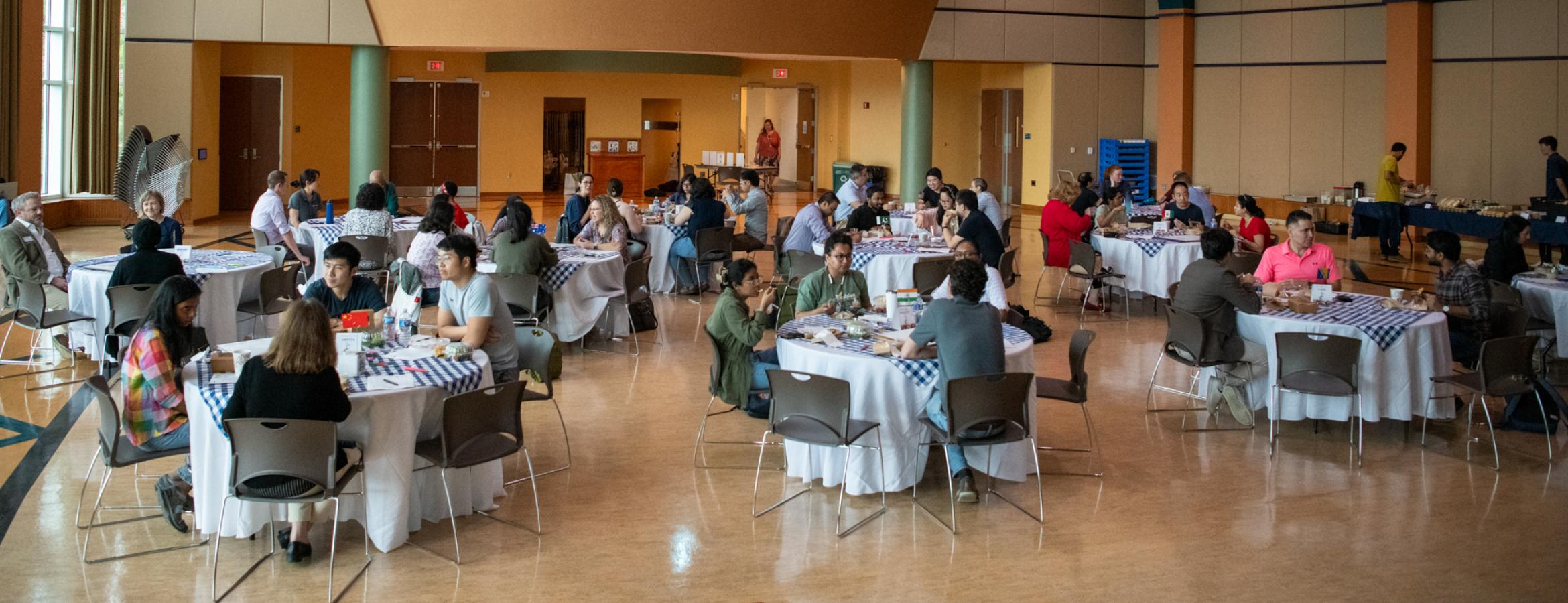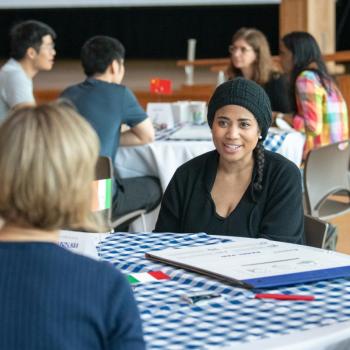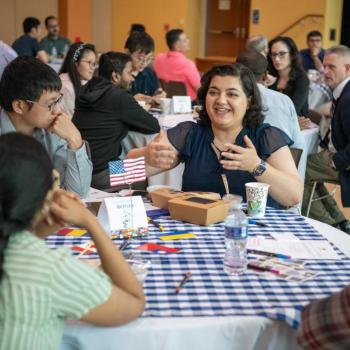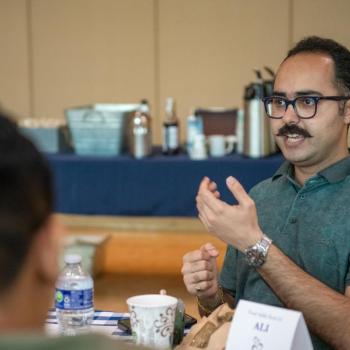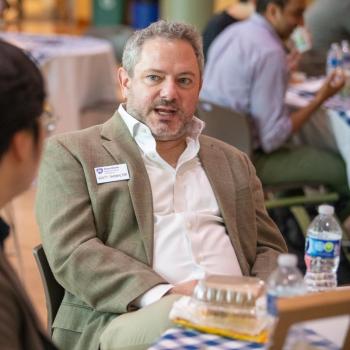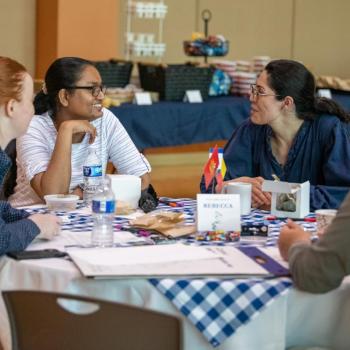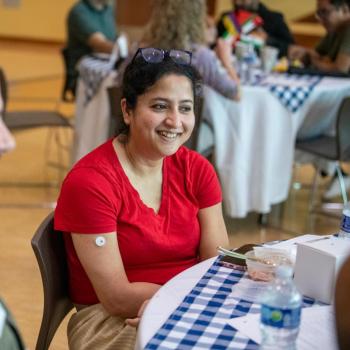Eberly College of Science postdoctoral scholars Sebanti Chattopadhyay, a physics postdoc; Mark Lee, a chemistry and biochemistry and molecular biology postdoc; and Arpita Yadav, a biology postdoc, recently helped lead a special World Café to create a space for open conversation and encourage participation, with the goal of fostering discussion and uplifting the postdoc community.
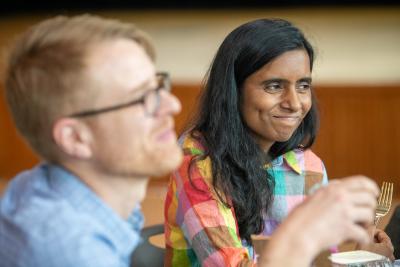
Serving on the Penn State Postdoctoral Society (PSPS), Chattopadhyay, Lee and Yadav, were originally introduced to the idea of hosting an event by Jennifer Nicholas, director of postdoctoral affairs.
“Currently, I serve as an Eberly College Chair on the PSPS. Jennifer reached out to me to help lead a World Café for postdocs at Penn State,” said Yadav. “I thought that leading an event like this for the postdoc community could give me leadership experience and help me get to know the postdoc community.”
Nicholas added, “The World Café featured free-flowing dialogue on concerns that matter most to postdocs at this time. As the "bridge" between students and faculty, postdocs offer a unique lens for understanding the climate of our research community. Listening closely to them helps everyone.”
Hosted by the Office of Postdoctoral Affairs, the event was attended by over 70 postdocs, faculty, and staff members from across the University.
“Since the PSPS election in March, we have been working to develop the new PSPS council, where we plan events and networking opportunities for postdocs at Penn State. As the PSPS Chair and as a postdoc leader, Jennifer invited us to help lead this event,” said Chattopadhyay.
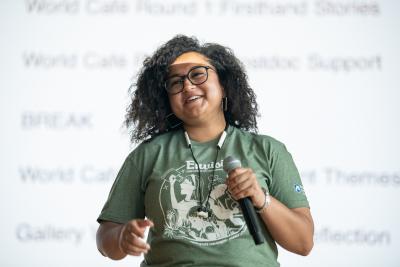
At the event, attendees rotated through various tables where they engaged in discussions led by postdoc leaders, like Chattopadhyay, Lee and Yadav, to help answer questions such as “What do postdocs need at different stages of their journey to feel seen, supported and successful?” and “What actions can we take as a community to improve the Penn State postdoctoral experience, honoring our international majority and commitment to inclusive mentoring?”
“The purpose of the event was to foster open conversations with postdocs. In addition to postdocs attending, we also had several faculty and staff members attend to listen and ask their questions,” added Lee
"Discussing these topics in mixed-discipline groups allowed the participating postdocs to encounter new solutions to the challenges facing them,” said Scott Showalter, assistant dean for graduate and postdoctoral affairs in the Eberly College of Science, professor of chemistry, and professor of biochemistry and molecular biology. “With the Eberly College of Science employing 130 postdoctoral scholars, one-third of all postdocs at Penn State University Park, it was just as important that the faculty and staff participating in the event were able to hear directly from postdocs what they need from their community and mentors. I hope that these conversations spark insight into how we can continue to improve the postdoc experience.”
The Eberly College of Science recently spoke to Chattopadhyay, Lee and Yadav about the World Café event and how postdocs can get more involved in future college and University events.
Q: What was one lesson or topic you learned from the World Café?
ML: I had a table with mostly faculty and a few postdocs, which ended up being an opportunity for faculty to ask questions about the needs of postdocs. Many faculty members mentioned that they wanted to know more about how they can support postdocs emotionally, physically, and career-wise.
SC: I was very happy that there was good participation from the postdoc community at this event. It was nice to hear faculty express solidarity with postdocs during these times, and faculty who came were able to share good advice for the postdocs at the table.
AY: At my tables, I observed faculty members who were very generous in sharing their experiences with the postdocs at the table. Hearing their expertise in what they’ve seen before and what they think can be done was useful. Most postdocs who shared during the conversation mentioned that interaction and community-building are something they would like to see more of.
Q: What message would you share with your fellow postdocs?
ML: I would encourage postdocs to keep showing up for these types of events in the future. It was very encouraging to see those who showed up to the World Café, but I also know that it’s hard to get postdocs out of their routine to attend these events. I hope that we can all remember that hearing the thoughts and experiences of others is important, and sharing these perspectives can be incredibly useful.
SC: Please do not wait to get involved. The postdoc council that we have formed is full of very welcoming and supportive people. Just by attending some of the events that keep happening regularly for the postdocs would be a great way to meet some new people and make connections.
AY: I would add that the postdoc council also hopes to have representation from each of the colleges at Penn State. If you are interested in getting involved, we welcome all postdocs to join. To join, simply email Jennifer Nicholas, jun149@psu.edu. Previously, picnics have been a popular event, but we also hope to expand and host more social events in the future.
Q: What do you hope to see for postdocs in the future?
SC: It was apparent, from the interest in the World Café, that postdocs want to get connected to each other. Aside from the programming that comes through Jennifer's office, the PSPS council also has plans for events, both social and professional, for the postdoc community. The hope is to get them to engage through these events.
AY: I agree with Sebanti. As a postdoc myself, I understand why it’s hard for people to get involved, but I want to emphasize that any postdoc is welcome to join the PSPS. As an Eberly Chair, I strongly believe in fostering engagement and building a supportive community where we can collaborate, share ideas, and most importantly, have open conversations to help one another succeed.
ML: I would like to see more gathering and building of community among postdocs. I know that something has to work to break the routine we get into of just going to work and straight home after. I hope that in the future, PSPS can get folks together to network and socialize.
